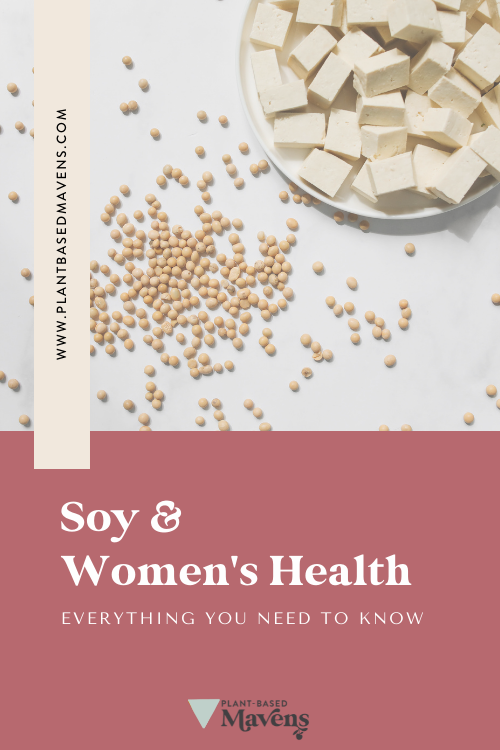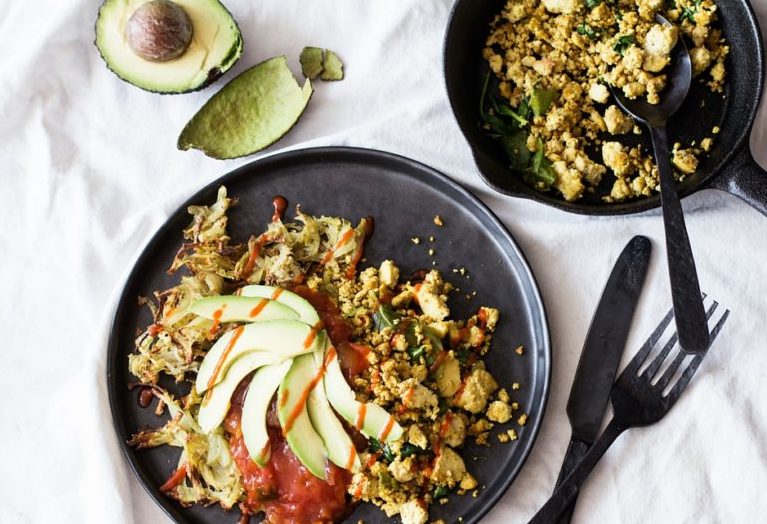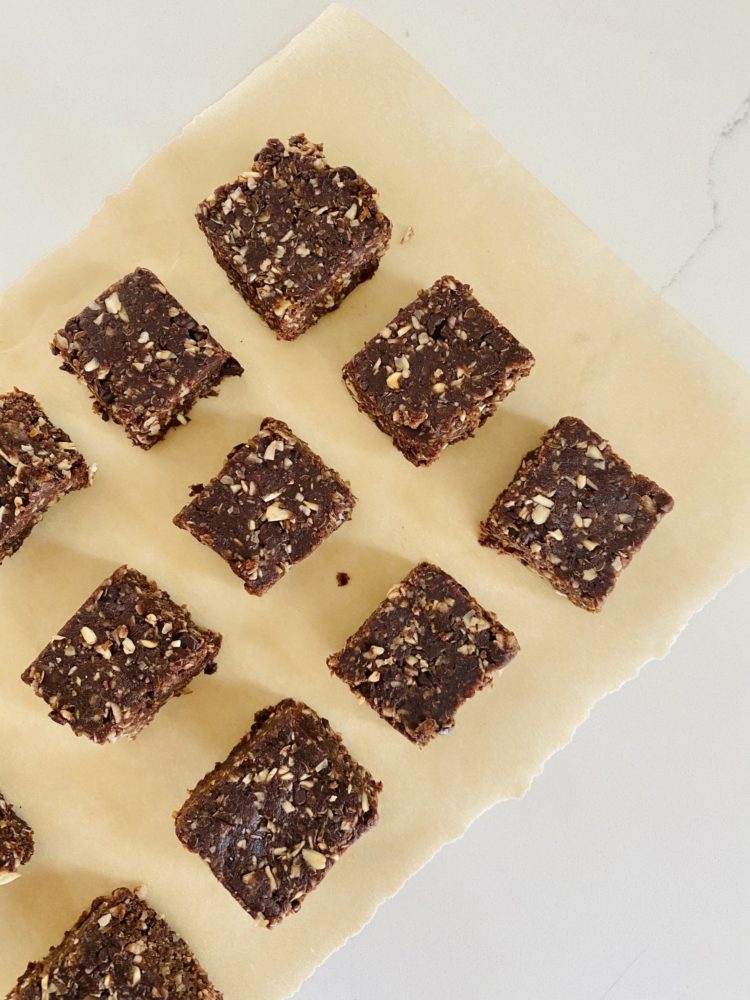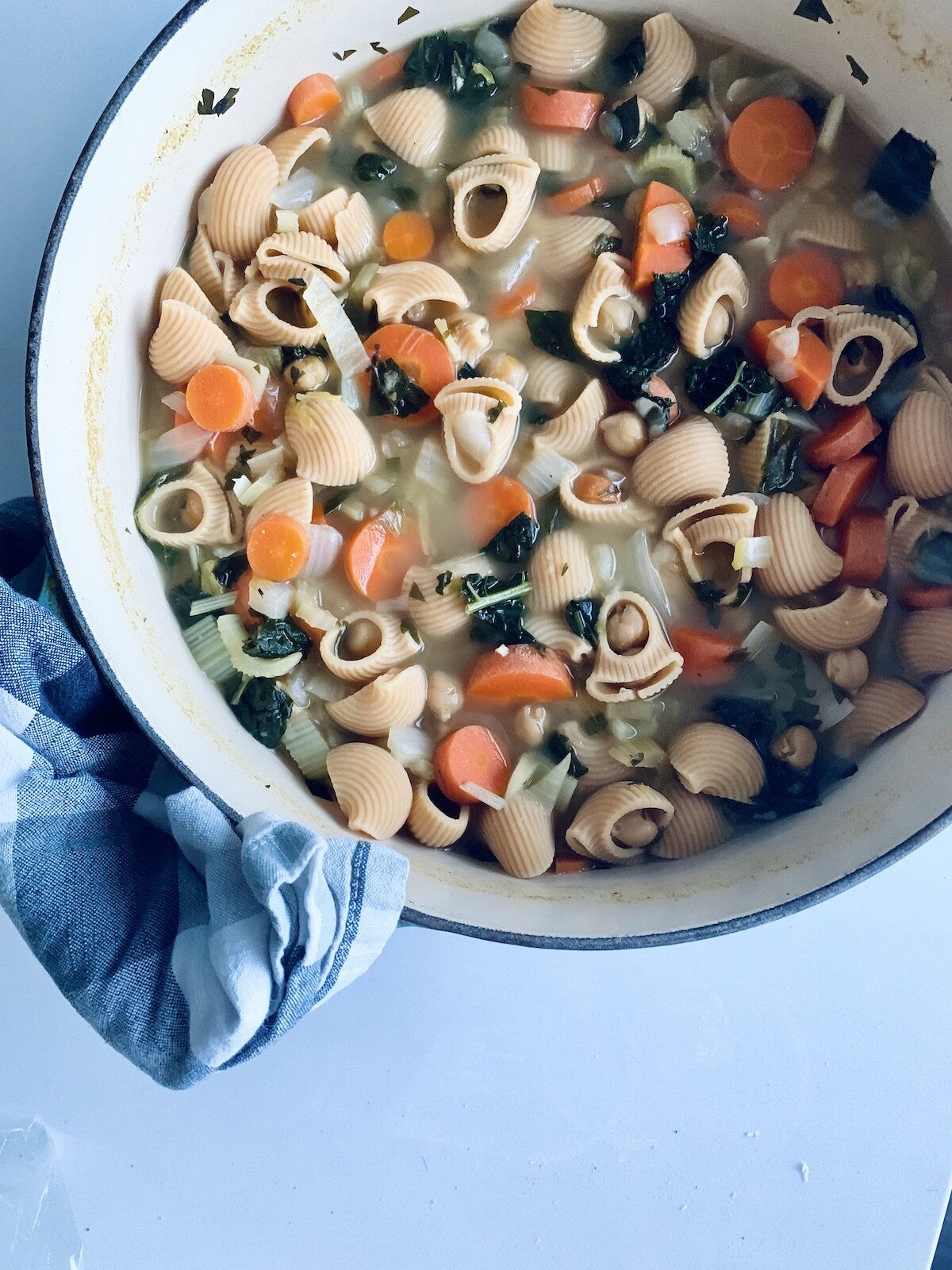The nutrition world is filled with controversial topics, and soy is definitely one of them. One of the most common questions I get as a plant-based dietitian is, “Is soy healthy for you?”
I think you’ll be surprised to see that the science isn’t quite as controversial as it seems. For most women, soy foods are a healthy choice. In this article we’ll cover the myths and facts surrounding soy, how to choose the healthiest soyfoods (and how to avoid the not-so-healthy ones), and clarify the most burning questions – what the heck are tofu and tempeh?? Let’s dive in!

What is soy?
Soy is a type of legume that has been a staple in many diets across Asia. It’s a staple food in plant-based diets. It is rich in high-quality protein and fiber. Soy is unique in that it is one of the few plant proteins that contain all nine essential amino acids, making it a complete protein source. (if you’re curious about plant-based proteins, read this article)
In addition to its protein content, soy is also low in fat and does not contain saturated fats. Soy contains compounds called isoflavones, which have been linked to potential health benefits.
Is soy healthy?
Short answer: yes! Soyfoods are the highest source of isoflavones. Isoflavones are plant estrogens and are also called phytoestrogens. This relationship to estrogen is at the root of most of the controversy surrounding soy. But these phytoestrogens do not behave the same as the hormone estrogen and actually have a lot of health benefits. Soy is a cornerstone of many traditional diets across Asia where it is common to eat 1-2 servings of traditional soy foods everyday. And it is linked to heart health, bone health, reduced hot flashes, and more.
Health benefits of soy
- Lower cholesterol levels
- Reduced risk of heart disease
- Protection against breast and prostate cancer
- Lower risk of diabetes and osteoporosis
- Improved menopause symptoms
- Rich in plant-based protein, fiber, vitamins, and minerals
- Cholesterol-free
- High in soy isoflavones, which are associated with various health benefits
Is it OK to eat soy everyday?
It is okay to eat soy everyday! Like any food, eating too much soy isn’t necessarily better. It’s best to stick with about 2-3 servings per day. One serving is equal to about ½ cup of tofu, tempeh, or edamame; or 1 cup of soymilk.
Whole soy vs. processed soy
It’s important to know that the health benefits you just learned about apply to minimally processed soyfoods and aren’t necessarily true for the abundance of heavily-processed soyfoods available today. The processing of these soyfoods removes much of the isoflavones as well as other key nutrients responsible for the health benefits of soy. To reap the rewards and steer clear of any unhealthy effects, stick to minimally processed soyfoods. like tofu, tempeh, edamame, and soy milk.
Minimally-processed Soyfoods:
- Miso paste
- Edamame
- Tempeh
- Tofu
- Soymilk
Processed Soyfoods:
- Soy proteins (used in protein bars and protein powders)
- Soy-based meat substitutes
- Sweetened soy milks and yogurts
- Meat alternatives like soy nuggets
- Energy bars that contain soy protein or soy crisps
Soy and Women’s Health
Soy and Cancer
Is soy healthy for cancer risk reduction and for cancer survivors? Research increasingly shows that soy’s high isoflavone and antioxidant content are actually protective against cancers, including the risk of breast cancer and ovarian cancer, as well as other chronic diseases. In Asia, women who eat the most soy have lower rates of breast cancer compared to women who eat very little soy. However, it appears that women need to have begun eating soy in childhood for this benefit to hold true. For women with breast cancer, eating soyfoods may support greater survival and decreased chance of recurrence. Many prominent cancer organizations, including the American Cancer Society, agree that it is safe for women with breast cancer to eat soy.
Soy and Thyroid Health
You may have heard that soy can negatively interfere with thyroid health, specifically increasing the risk of hypothyroidism, but for people with healthy thyroids soy is safe. If you have low thyroid function and are taking thyroid medication, then it’s advised that you do not over-consume soy and do not consume soy within a few hours of taking thyroid medication.
Soy and Menopause
In a study published in the journal Menopause, researchers found that women who consumed about 2 servings of soyfoods per day can help reduce the frequency and severity of hot flashes by 50%. Soy contains natural compounds called phytoestrogens, which are plant-based estrogens similar to the hormone produced by the human body. During menopause, estrogen levels drop, leading to various menopausal symptoms such as hot flashes, night sweats, and mood swings.
Phytoestrogens in soy can act as weak estrogens in the body, helping to alleviate menopausal symptoms. They can bind to estrogen receptors and have a balancing effect on hormone levels. This can result in a reduction in the frequency and intensity of hot flashes, which are one of the most bothersome symptoms for many women going through menopause.
It’s important to note that the effectiveness of soy in reducing hot flashes may vary from person to person. While some women may experience significant relief, others may not see the same results. However, considering the potential benefits and the overall health profile of soy, it’s certainly worth a try to see if it helps you!
Soy and Fertility
Is soy healthy for fertility and reproductive health? Yes! The isoflavones in soy do not have any effect on hormone levels in men or women, including estrogen and testosterone. Isoflavones also don’t affect sperm or semen. Numerous studies have been conducted on the effects of soy consumption on reproductive health, and the results consistently show that isoflavones, the compounds found in soy, do not have any significant impact on hormone levels in both men and women. This means that consuming soy products, even in moderate to high amounts, does not alter estrogen or testosterone levels.
For men, there is often concern that soy may decrease testosterone levels or have negative effects on sperm production. However, research has shown that soy consumption does not affect sperm count, quality, or motility. In fact, a study published in the journal Fertility and Sterility found that consuming soy does not have adverse effects on semen parameters in men.
Similarly, for women, soy consumption does not lead to hormonal imbalances or affect fertility. A meta-analysis published in the Journal of Clinical Endocrinology and Metabolism concluded that soy intake had no significant effect on menstrual cycle length, hormone levels, or ovulation in women.
In fact, soy has been found to have potential benefits for reproductive health. For women, incorporating soy products into their diet may help alleviate symptoms such as menstrual cramps and premenstrual syndrome (PMS). Soy isoflavones have been shown to have anti-inflammatory properties that can reduce the severity of menstrual cramps. A study published in the Journal of Obstetrics and Gynecology found that consuming soy protein significantly decreased the intensity of menstrual pain in women.
If you want to know more about how plant-based diets can boost fertility, read this post.
Is soy healthy in pregnancy?
You might also be curious whether soy is safe to eat during pregnancy. Soy foods can be especially helpful in pregnancy to meet higher nutrition needs without relying heavily on more animal foods. Soyfoods offer a rich source of plant-based protein, essential vitamins and minerals like folate, calcium, iron, and zinc, and phytochemicals. These nutrients play a crucial role in supporting a healthy pregnancy.
One concern often raised is the potential estrogenic effects of soy on the developing fetus. However, research has shown that moderate consumption of soy foods does not pose any harm or risk to the baby. In fact, soy intake during pregnancy has been associated with a range of benefits.
Want to know more about eating plant-based during pregnancy? Here’s your ultimate guide!
Is soy healthy for babies and children?
Soy-based infant formula has also been the source of controversy, but the American Academy of Pediatrics agrees that soy formula is safe for full term infants (it is not recommended for preterm infants). Soy formula has been shown to cause less of an immune response compared to cow’s milk-based formula.
Studies show that children who consume soy do not experience any abnormal changes in hormone levels or in the age at which they reach puberty. And don’t forget those added benefits later in life from consuming soy in childhood.
Common Questions About Soy
Should you avoid genetically modified (GMO) soy?
When it comes to genetically modified foods, my recommendation is to err on the side of caution and avoid GMO foods whenever possible. An herbicide called glyphosate (known in the market as Roundup) has been labeled a probable human carcinogen by the World Health Organization in 2015, and the heaviest use of Roundup is on GMO crops. Because it is not out of the realm of possibility that this chemical could end up in the final foods, I think it is best to opt for organic soyfoods when possible.
What is tofu?
Tofu is essentially curdled soymilk, similar to how cheese is made from curdled milk. Tofu originated in China where it has been made and eaten for over 2,000 years. Over that time, it spread to many other regions of Asia, becoming a staple food in many Asian cultures. It’s a wonderfully flexible ingredient with many types and endless uses.
Types of Tofu
- Silken: undrained, unpressed, custard-like texture. Use in creamy or blended foods (smoothies, sauces, desserts). Great as an egg substitute!
- Firm/Extra-firm: pressed, packed in water (simply drain and pat dry before cooking). Absorbs flavors well. Great for stir fry, baked, crumbled, and grilled.
- Super Firm: very dense, high protein, not packed in water. Good choice when you’re in a hurry. Doesn’t absorb flavor as well and dries out easily.
How To Cook Tofu:
- Press it. Most tofu comes packed in water, so you must drain and press it. If you skip this step, your tofu won’t absorb marinades or get crispy when cooked. First, drain the water. Then, slice the block and gently press slices between paper towels or a dish cloth to soak up excess water. After you absorb as much water as possible, marinate or start cooking.
- Marinate it. After you’ve pressed tofu, it’s ready to absorb any flavor you introduce to it. Since even pressed tofu contains some water, exclude oils from your marinade (oil and water don’t mix!). Use vinegars or citrus juices as a base instead.
- Blend it. Tofu blends well into smoothies, sauces, and dressings to add creaminess, protein, and calcium (calcium-set tofu contains more calcium than Greek yogurt). It also makes great eggless quiches.
- Crumble it. Crumbled, seasoned tofu takes on the texture of scrambled eggs or ricotta cheese. You can also crumble tofu into soups or chili for a “meaty” texture. It’ll soak up all the flavors of the broth.
Here are a few of my favorite tofu recipes: The Easiest Tofu Scramble, Tofu Frittata, and PB&J Protein Smoothie.
What is tempeh?
Tempeh is made from fermented soybeans and has an appealing crumbled texture similar to ground meat. It originated in Indonesia. Because of its firm, dry texture, it can be easily sliced, cubed, and crumbled for a wide array of culinary uses including ground beef, bacon slices, and kabobs. In the United States, tempeh is less well-known than tofu, yet many find the texture of tempeh to be more palatable and easier to cook with compared to tofu’s spongy nature. Like tofu, tempeh is the ultimate chameleon, with the ability to take on almost any flavor.
How To Cook Tempeh:
- Steam it. If you find tempeh to be too bitter straight out of the package, steaming or simmering it can help to remove bitterness and prepare it to better absorb marinades. (roasting in the oven works too!)To steam: set up a steamer basket over a pot of boiling water and place the tempeh in the basket. Cover it and let it steam for 10-15 minutes.To simmer: fill a saucepan with an inch or two of water, broth or marinade and bring it to a boil. Place the tempeh in the saucepan, cover the pot, reduce the heat and let the tempeh simmer for 10-15 minutes. Remove the tempeh from the liquid and pat it dry.
- Marinate it. Submerge tempeh slices, cubes or crumbles in marinade of choice for at least 30 minutes or overnight if possible.
- Slice it thin. Tempeh can be sliced into any shape. Slicing it into about ¼ inch thick pieces helps it to become crispy on the edges while retaining a nice, chewy interior when sautéing or baking.
- Crumble it. Tempeh takes on the flavor of whatever it’s cooked in, making it a versatile way to add heartiness and protein to a meal. Add crumbled, grated, or cubed tempeh to spaghetti sauce, stew, chili, or curry.
This Easy Curry Tempeh Salad is a great way to dip your toe into cooking with tempeh!
BTW, you might also like…
The Ultimate Guide to Plant-based Nutrition and Women’s Health
The Meal Planning Made Easy Guide
The First 5 Things You Should Do When You Go Plant-based


